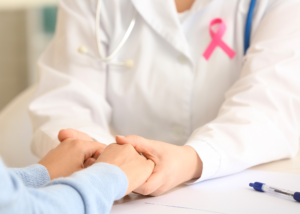Breast Cancer Screenings
LCH offers breast cancer screenings to patients in West Grove, PA, and southern Chester County.
Breast Cancer Screenings in West Grove
Breast cancer screenings are a powerful tool in detecting it at the earliest and most treatable stages.

A breast cancer screening is a routine examination to look for early signs of cancer. According to the American Cancer Society, breast cancer discovered during a screening before any symptoms are noticed is often caught before it has spread.
Breast cancer screenings are an important preventative and diagnostic tool in our health services. Our clinicians recommend screenings based on various breast cancer risk factors, though a referral for one does not necessarily mean there is a suspicion of cancer.
About the Program
The Women’s Health Center in our West Grove office delivers personalized care to patients of all ages. Early detection of breast cancer saves countless lives, and our providers are committed to ensuring that all of our qualifying patients have access to breast cancer screenings.
Patients of average risk will receive a clinical breast exam during their annual health visits. Average risk means that a patient doesn’t have a family history of breast cancer or a known cancer causing gene. Mammograms are recommended for people who have higher risk of breast cancer, or are over the age of 40.
Patients who have a high risk of breast cancer due to family history or the breast cancer gene should start getting screened by mammogram at age 30. Whether they begin at age 30 or 40, mammograms should continue yearly. Around age 55, they can be spread out to every other year.
Benefits of Breast Cancer Screenings
The benefit of screenings is that if cancer is present, it is more likely to be caught before a person has symptoms. Once symptoms are noticeable, there is a higher chance that it has already spread to other parts of the body and will require far more intensive treatment.
Early breast cancer detection and treatment offers the best chances of long-term survival.
Breast Cancer Screening Options
Our Women’s Health Center team has several breast cancer screening tools to serve our patients.
 We recommend each screening option based on individual risk factors. LCH follows the American Cancer Society’s guidelines for determining a patient’s risk level. If you are ever concerned about your risk of breast cancer, or you believe you may have a higher risk than our guidelines suggest, don’t hesitate to discuss it with our clinicians. We take your concerns seriously and will work with you to ensure you receive the best care for your circumstances.
We recommend each screening option based on individual risk factors. LCH follows the American Cancer Society’s guidelines for determining a patient’s risk level. If you are ever concerned about your risk of breast cancer, or you believe you may have a higher risk than our guidelines suggest, don’t hesitate to discuss it with our clinicians. We take your concerns seriously and will work with you to ensure you receive the best care for your circumstances.
In between clinical screenings, we recommend paying attention to your breast health through self-exam. If you notice lumps, nipple discharge, or other abnormalities, call our office to schedule an appointment.
Screening Tests and Examinations
We have several methods for screening that will be used based on risk and symptoms.
Clinical Breast Exam – This basic screening is performed during your yearly health exam. The provider will examine your breasts to feel for lumps or anything of concern.
Mammogram – Our most common breast cancer screening tool is an x-ray that captures an image of the breast tissue. As a diagnostic tool, mammograms may find tumors that are too small or too deep within the breast tissue to be felt by hand. There are three types of mammograms:
- Film mammography – the x-ray pictures will be printed on film for visual review on a light board.
- Digital mammography – the x-ray pictures will be recorded to a digital file rather than a physical printout. This allows your providers to view the results quickly and share them with other specialists if necessary.
- Digital breast tomosynthesis (DBT) – this is also called a 3D mammogram, and it is a newer technology. Many clinicians find this to be a better kind of mammography for patients with dense breast tissue.
Breast Magnetic Resonance Imaging (MRI) – For higher risk patients, MRI is often the screening tool of choice. This test uses radio waves instead of x-ray to take several pictures inside the breasts.
Breast cancer screening tools are continually being developed in order to find the most accurate early detection methods. Several technologies are being researched or are in the clinical trial phase.
Our team of doctors, practitioners, and OBGYNs make the breast cancer screening process as simple as possible.
Preparing for Your Breast Cancer Screening
We strive to make scheduling and preparing for your mammogram very simple.
Our goal is to make sure you are as comfortable and informed as possible so that everything goes smoothly. The following tips will help you have a successful breast cancer screening:
- Schedule your mammogram for a time of month when your breasts are less likely to be tender. It’s best to avoid the week right before your period.
- Do not apply deodorant, lotion, perfume, or oil the day of your mammogram, as these substances can impact the x-ray images.
- Wear a separate top and bottom to your appointment so that you don’t have to get completely undressed. Only your shirt and bra will need to be removed for the mammogram.
- You can take an over the counter pain reliever like Tylenol or Ibuprofen before the appointment to decrease discomfort during or after the mammogram.
- All jewelry must be removed for the exam, so consider leaving it at home to avoid losing it in your changing room.
- Bring along mammogram or biopsy films or images if you have any from a previous provider.
Mammograms do not require any fasting, so go ahead and have your normal meals the day of your screening.
Call our offices at 610-444-7550 to schedule a breast cancer screening appointment.
Frequently Asked Questions
Our team is happy to support you by answering your questions and listening to your concerns regarding breast cancer screenings. To schedule an appointment at our West Grove Women's Health Center, please call us at 610-444-7550.
Are there any risks associated with breast cancer screenings?
Breast cancer screenings can produce false positive results and overdiagnosis. This means that something is identified as possibly being cancer that is benign or something that would resolve on its own without intervention. When this happens, unnecessary treatments could be applied. Additional risks are that mammograms expose the breast tissue to a small dose of radiation, and they do not always find cancer that is present.
What causes breast cancer?
Cancer occurs when cells begin to grow abnormally. These growths get larger and become tumors, then spread to other parts of the body. Some cancer cells will be discovered by the immune system and eradicated naturally. Those that do not will continue to grow into progressive disease.
What treatment could be prescribed for people diagnosed with breast cancer?
Breast cancer treatments include surgery, chemotherapy, radiation, hormone therapy, and immunotherapy. New treatments are always in development. Nutrition and palliative therapies may also be recommended during treatment.
How common is breast cancer?
Breast cancer is one of the most common types of cancer to affect patients in the U.S. Approximately 300,000 people receive a diagnosis each year.
What do my breast cancer screening results mean?
Always review the results of your mammogram, MRI, or biopsy with your medical provider. They will explain their findings in the context of your risk factors and overall health.
How often should I get a mammogram?
People with average risk should get their first mammogram around age 40 and continue with annual screenings until their mid-50s. At that time, they can reduce the frequency to every other year. People who are diagnosed with breast cancer or have a higher risk of disease may need more frequent screenings as recommended by their doctor.
When should I begin getting mammograms?
People with a personal or family history of breast cancer, or people who have a genetic marker for breast cancer, should get their first mammogram by age 30. If there are no serious risk factors present, the first mammogram should be around age 40. Always speak with your medical provider to determine the best recommendation for your individual health needs.
